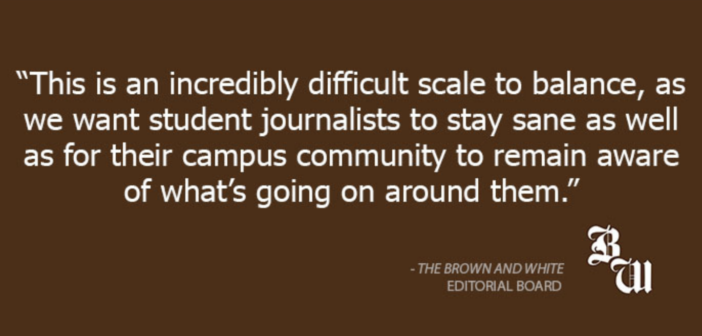On Oct. 20, the University of South Carolina’s student newspaper The Daily Gamecock decided to take a one-week publication hiatus to account for students’ mental health given the current relentless bad news cycle.
While we as a society rely on media and information to stay aware of the world around us, which is of utmost importance right now for a multitude of reasons, we as a student publication also empathize with these students and understand what they are going through.
Even for those in non-media-based careers, everyone is facing a sense of information exhaustion. We are being bombarded with changing facts about the coronavirus, we are in a crucial election year and social justice issues are being brought to the surface at an increasing level. More often than not, what we hear is heartbreaking or anxiety-inducing, and after eight months of solely sad news it makes more than logical sense that mental health nationwide is deteriorating.
Add the stress of the early months of quarantining earlier this year, the workload that comes with being a college student in general, the grief from a drastically altered semester on top of being responsible for reporting more sad news on a weekly basis to a campus — it seems like a recipe for a mental health nightmare for student journalists everywhere.
We often hear the saying “no news is good news.” While this may be true on one extreme, it appears that too much bad news can lead to a decrease in motivation and ability to manage the repercussions of it all, too. This is an incredibly difficult scale to balance, as we want student journalists to stay sane as well as for their campus community to remain aware of what’s going on around them.
While we ultimately did not reach the same decision as The Daily Gamecock, something we as a student publication often grieve is our ability to work together twice a week in the newsroom on the third floor of Coppee Hall. Part of being part of this publication is the camaraderie and relationships between staff members. Most of us may argue it’s just as important to us as telling the news day-in and day-out.
When we can be together and designate the two days each week to prepare for print issues, the news cycle becomes so ingrained in our workload that there’s never a news break. While of course it is necessary to keep tabs on all that is going on relevant to our reporting, this makes what we do pretty all-consuming. This can most certainly lead to burnout, although it has hit each of us at different times throughout the last few months.
Additionally, the digital environment often makes our interactions seem somewhat transactional. Instead of having conversations over story edits and layout designs, we are tagging each other on Slack to let each other know when it’s time for one of us to take the next step. We lose the organic newsroom atmosphere when we are not all together, which has been a constant in workplaces — specifically news workplaces — all across the country.
Media professionals are facing an incredibly toxic work environment given the current state of politics and global issues we are all grappling with right now. News outlets attempting to hold the bodies that govern us accountable in a time where the media is portrayed as untrustworthy is difficult enough. Adding on the elements of reporting on world-changing and life-altering topics, it becomes clear that journalists have tremendous scales to balance, both in terms of their reporting as well as their own personal lives and distressing workload.
If seasoned journalists and executives are having a difficult time handling the media climate right now, how can you not expect 18- to 22-year-old student journalists to do so either?
While there may not be a perfect way to handle reporting on a college campus right now, there are ways we can encourage students as well as people everywhere to balance what they’re consuming.
This means knowing your boundaries. On TV. On Twitter. On Instagram. On news websites. On TikTok. All of it.
When it becomes all-consuming is when it becomes inorganic and overwhelming. Give yourself the grace to take a step back and realize the cost of staying too informed.
We understand the urge to keep checking, but remember to check in on yourself.






Comment policy
Comments posted to The Brown and White website are reviewed by a moderator before being approved. Incendiary speech or harassing language, including comments targeted at individuals, may be deemed unacceptable and not published. Spam and other soliciting will also be declined.
The Brown and White also reserves the right to not publish entirely anonymous comments.